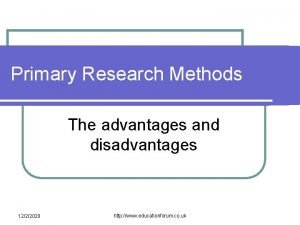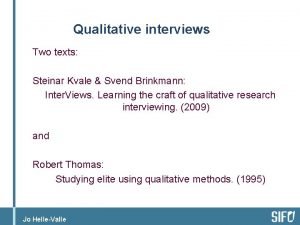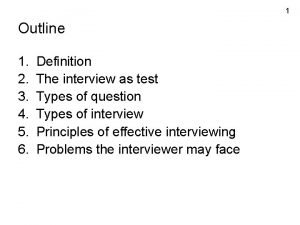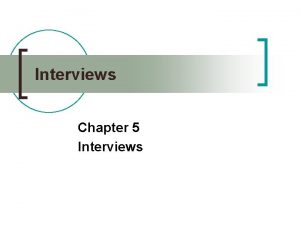Repeated questions and repeated interviews in forensic investigations





















- Slides: 21

Repeated questions and repeated interviews in forensic investigations with intellectually disabled victims David La Rooy david@larooy. net University of Abertay Dundee and Scottish Institute for Policing Research

• Cederborg, A-C. , Danielsson, H. , La Rooy, D. , & Lamb, M. (2008). The effect of repeating contaminating questions when people with intellectual disabilities are interviewed. Submitted to Journal of Intellectual Disability Research.

• Psychology studies of repeated questions within interviews • School based events: • What was in the bag? (closed-format questions) • Percentage of children who change answers: • 88% (Howie et al. , 2004) • Percentage of changed answers: • 20% (Krähenbühl & Blades, 2006) • 25% (Poole & White, 1991) • Motivational pressure (Lyon, 2002): • 1) Children believe that their first answer was incorrect • 2) Children change their answer to please the interviewer

• Recommendations for interviewers • “Specific-closed questions should not be repeated in the same form when the first answer is deemed unsatisfactory or incomplete. Children may interpret this as a criticism of their earlier response and sometimes change their response as a consequence, perhaps to one that they believe is closer to the answer the interviewer wants to hear. ” (Home Office, 2007, section 2. 165) • (Also Home Office, 2002, section 2. 122)

• Recommendations for interviewers • “ If interviewers decide to repeat one or more questions later on in the interview, even with changed wording, they should also explain that it does not necessarily indicate that they were unhappy with the witness’ initial responses; they just want to check their understanding of the witness. ” (Home Office, 2002, section, 3. 139 with respect to children; Home Office, 2007, section 3. 202 with respect to vulnerable witnesses) • Establish ground rules: “if questions are repeated this does not mean the child’s first answer was wrong or thought to be a lie. ” (Scottish Executive, 2003, p. 53)

• How do children & youths who have intellectual disabilities answer repeated questions in forensic interviews? • Depending on disabilities • Limited memory skills (Gudjonsson & Henry, 2003) • Difficulty understanding questions (Trevarthen, 2000) • Interviewers may rely more on repeated questions because children & youths with intellectual disabilities are less informative • At present there are no studies that have investigated how children & youths with intellectual disabilities answer repeated questions in forensic interviews

• Sample for repeated questions study • 34 interviews with children & youths with intellectual disabilities • Non-clinical diagnosis of intellectual disability • Diverse array of disabilities • Developmental delay (N=23) • Asperger syndrome (N = 4) • Developmental delay & asperger syndrome (N = 7) • Aged 5 to 19 years old when last abused • (Average = 12 years) • Most were sexually abused (N = 31) • Some were physically abused (N = 4)

• Method • Interviews were transcribed • All focused questions were identified in the substantive phase of the interview • Repeated questions within interviews were identified • You laid on the sofa, didn’t you? • Did you lie on the sofa? • Responses were categorised as: • Agreement • Disagreement • Other

• Results • 85% of interviews contained repeated questions • Total number of questions = 5764 • 49% of questions were focused questions (2858) • 9% of focused questions were repeated (260)

Responses to repeated questions Response to repetition Agreeing Disagreeing Other Sum First response Agreeing 29% 13% 3% 45% Disagreeing 13% 28% 7% 48% Other 2% 2% 4% 8% Sum 44% 43% 100%

• Conclusions about repeated questions • 40% of responses changed when questions were repeated (a high estimate compared to psychology studies) • Contradictions may decrease credibility • Asking repeated questions may be particularly problematic with children and youths who have intellectual disabilities • Interviews in the UK – use of repeated questions? • Little information as to the effect of explaining the reasons why questions are repeated as recommended in UK guidelines – does this reduce contradictions in vulnerable witnesses?

• Cederborg, A-C. , La Rooy, D. , & Lamb, M. (2008). Repeated interviews with children who have intellectual disabilities. Journal of Applied Research in Intellectual Disabilities. 21, 103 -113. • ‘Think twice’. Police Review. (October 12, 2007)

• Psychology studies of repeated interviews • Recall improves with repeated interviews • New information provided can be highly accurate • 87% - Gilbert & Fisher (2006) • 92% - La Rooy, Pipe & Murray (2005) • Repeated interviews exacerbate suggestibility • Bruck, Ceci & Hembrooke (2002) • Leichtman & Ceci (1995)

• Recommendations for interviewers • ‘One interview’ rule • Avoid repeated interviews • Suggestive • Witness inconsistency • Unnecessary and oppressive • Distressing or stressful • Loss of spontaneity • For specific references to interview guidelines see: • • Scottish Executive, 2001, p. 74 Scottish Executive, 2003, section 30 Scottish Executive, 2007, sections 7 & 155 Home Office, 2007, sections 2. 13, 2. 117 & 2. 188

• Recommendations for interviewers • Repeated interviews with children are commonplace (Scottish Executive, 2001, p. 69, p. 76) • Exceptions to the ‘one interview’ rule • Distress • Trust and rapport • Disclosure issues • New leads • Multiple offences • Learning disabilities or short attention spans • For specific references to interview guidelines see • Scottish Executive, 2003, sections 30, 108 • Scottish Executive, 2007, section 328 • Home Office, 2007, sections 2. 117, 2. 206, 2. 188, 2. 225

• Sample for repeated interview study • 20 interviews with children & youths with intellectual disabilities • Non-clinical diagnosis of disability • Diverse array of disabilities • • Developmental delay (N=12) ADHD/ADD (N=3) Developmental delay & autistic features (N=4) Autistic features (N=1) • Age 6 to 22 years old when last abused • (Average = 16 years) • Delay to first interview 300 days • Delay between interviews 51 days • Most were sexually abused (N=19) • Some were physically abused (N=3)

• Method • All substantial information in the second interview was categorised as: • Elaborated • Completely new • Repeated • Contradicted

Interview quality Question types Open ended ‘Wh’ Option posing Suggestive Other

Central information in the repeated interview Information type Elaboration New Repeated Contradiction

• Conclusions about repeated interviews • Children & youths with intellectual disabilities were informative in the repeated interviews • 80% of the information was new • 1% contradictions • Repeated interviews can be justified within current UK guidelines for use with children & youths with intellectual disabilities

• Overall conclusions • Repeated interviews caused fewer contradictions than repeating questions within interviews • Repeated interviews may be a way forward • Video recording in Scotland will be rolled out in the near future • This will allow the possibility of directly assessing the quality of interviews conducted with vulnerable victims • Proposed research • Survey of the quality of interviews in Scotland
 Chapter 6 fingerprints
Chapter 6 fingerprints Forensic pathologist vs forensic anthropologist
Forensic pathologist vs forensic anthropologist Forensic psychiatry vs forensic psychology
Forensic psychiatry vs forensic psychology Face to face interview pros and cons
Face to face interview pros and cons List of employee strengths and weaknesses examples
List of employee strengths and weaknesses examples What are the advantages of primary research
What are the advantages of primary research Interviews and questionnaires
Interviews and questionnaires Kvale og brinkmann
Kvale og brinkmann Marking bad clusters data hiding technique
Marking bad clusters data hiding technique Forensics
Forensics Guide to computer forensics and investigations
Guide to computer forensics and investigations Repeated percentage change questions and answers
Repeated percentage change questions and answers Data collection instruments in qualitative research
Data collection instruments in qualitative research Unusual job interviews
Unusual job interviews Ethnography research topics
Ethnography research topics Primary research interviews
Primary research interviews Forskningsspørgsmål og interviewspørgsmål
Forskningsspørgsmål og interviewspørgsmål Types of interviews structured semi structured unstructured
Types of interviews structured semi structured unstructured Disadvantages of unstructured interviews
Disadvantages of unstructured interviews Lean discovery
Lean discovery Disadvantages of unstructured interviews
Disadvantages of unstructured interviews Disadvantages of unstructured interviews
Disadvantages of unstructured interviews









































